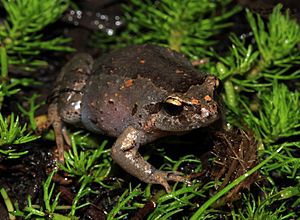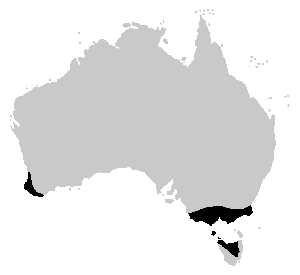Geocrinia facts for kids
Quick facts for kids Geocrinia |
|
|---|---|
 |
|
| Geocrinia laevis | |
| Scientific classification |
|
| Kingdom: | Animalia |
| Phylum: | Chordata |
| Class: | Amphibia |
| Order: | Anura |
| Family: | Myobatrachidae |
| Subfamily: | Myobatrachinae |
| Genus: | Geocrinia Blake, 1973 |
| Species | |
|
See text |
|
 |
|
| Distribution of Geocrinia | |
Geocrinia is a special group of frogs. They are part of the Myobatrachidae family. These frogs live only in Australia.
For a long time, all Geocrinia frogs were thought to be part of another group called Crinia. But scientists found some big differences. Geocrinia frogs have a slightly stronger body. Their skin on the belly is smoother. The biggest difference is how they have babies. They lay their eggs outside of water!
Some Geocrinia species complete their entire tadpole stage inside the egg. Others start developing in the egg. Then, when enough rain falls, they hatch. They finish growing into frogs in the water.
There are seven known species of Geocrinia frogs. Five of these species live in Western Australia. The other two species are found in south-eastern Australia.
One species, the Geocrinia alba, is in great danger. It is called critically endangered. This is because its home is being lost. More land is used for growing grapes for the wine industry in Western Australia.
Species of Geocrinia Frogs
| Common name | Binomial name |
|---|---|
| White-bellied frog | Geocrinia alba (Wardell-Johnson & Roberts, 1989) |
| Smooth frog | Geocrinia laevis (Günther, 1864) |
| Lea's frog | Geocrinia leai (J. J. Fletcher, 1898) |
| Walpole's frog | Geocrinia lutea (Main, 1963) |
| Karri frog | Geocrinia rosea (Harrison, 1927) |
| Eastern smooth frog | Geocrinia victoriana (Boulenger, 1888) |
| Orange-bellied frog | Geocrinia vitellina (Wardell-Johnson & Roberts, 1989) |
See also
 In Spanish: Geocrinia para niños
In Spanish: Geocrinia para niños
 | DeHart Hubbard |
 | Wilma Rudolph |
 | Jesse Owens |
 | Jackie Joyner-Kersee |
 | Major Taylor |

